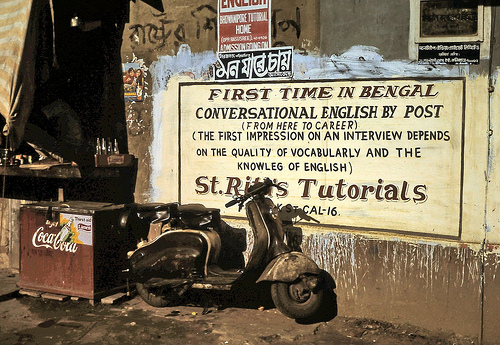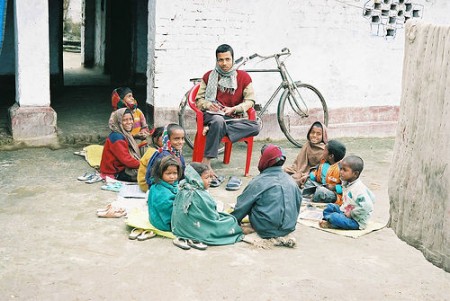
A recent BBC article takes up the debate that has been ongoing in India on whether to teach English in schools and colleges. The issue is like a double-edged sword. In a trend towards “Indianization”, many schools and colleges are putting increased emphasis on teaching and even academic writing in vernacular languages. Yet those schools and colleges that teach exclusively in English are often considered of higher quality, and the students of these institutions are privileged because they can get better jobs, rise in social status and get a piece of the cake of India’s tremendous economic growth. Such is the role of English as a social divider that there are plenty of politics involved in preventing the lower classes and castes from learning it.
When the (British) East India Company first came to India, members of high castes became intermediaries between the British rulers and Indian society at large. They were privileged and acquired good positions during the British rule. Today, those who are proficient in English are privileged because they can get one of the numerous jobs created through the outsourcing of services from the western world to India. Knowing English is a crucial skill on the Indian labor market. Even university graduates can’t hope to get a decent job if they don’t know English, which is one reason why educated unemployment is so high.
Though English has become part and parcel of Indian society, the impression in the West that “everyone in India speaks English” is simply wrong. There are 22 constitutionally recognized languages in India. And while India has two national languages for central administrative purposes, Hindi and English, it is Hindi that is the national, official, and uniting language of India. English is an associate official language, useful in particular because while Hindi is spoken and understood in most parts of North India, this is not the case in the South.
Apart from being the glue that holds the large bureaucracy together if all other languages fail, English is popular in the Indian parliament, judiciary, in the media, business and of course in the world-famous Indian IT industry. Generally, the growing role of the internet in all these fields has only contributed to the popularity of English as a lingua franca. English has also made its way into the ordinary language of people who would consider themselves non-English speakers or are illiterate: Time kya hua, bhai? (What’s the time, brother?); aaj date kya hai? (What’s the date today?); kya tum school jaate ho? (Do you go to school?); or, election kab hai? (When is the election?) etc.




